Build It and They Will Come | Vermont’s Kingdom Trails
Mountain bikers from around the country have flocked to Vermont’s Kingdom Trails. But locals and cyclists alike wonder if it is too much of a good thing.
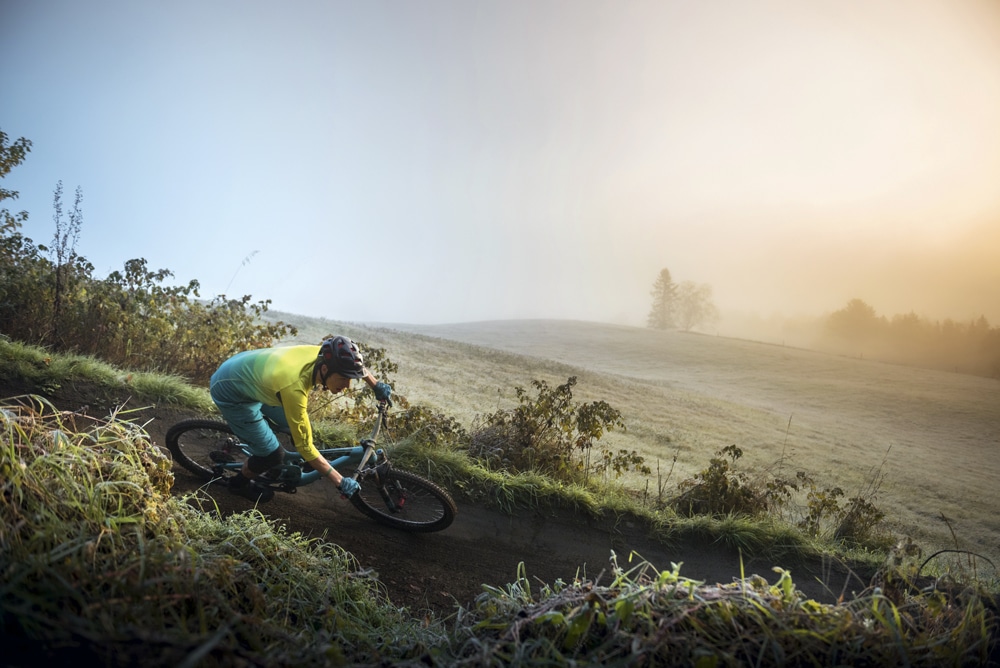
Seasoned mountain biker and professional sports photographer Brooks Curran of Waitsfield, Vermont, takes a sunrise ride on Heaven’s Bench, part of the Kingdom Trails network in Vermont’s Northeast Kingdom.
Photo Credit : Dave Trumpore
Photo Credit : Dave Trumpore
By Jonathan Green
HERO DIRT
With a powerful sweep of the cranks, John Worth bursts out of the darkened tree line into the amber sunshine bathing the shoulder of Umpire Mountain before plunging his bicycle toward a precipice, some 1,500 feet above the valley floor. The sweet scent of fresh rainfall mingles with woodsmoke rising from a house on the flank of the peak as his knurled rear tire skitters over slick oak leaves carpeting the trail. Then gravity takes over, tugging him toward the cliff. “Don’t look over the edge!” he yells. “Keep your eyes on the trail.”
I blink sweat out of my eyes as I try to stay on his wheel. The suspension on my mountain bike gasps, bottoming out over granite boulders, before I realize that my increasing velocity is sending me down a chute angled to blast me off the side of the mountain as well. Too late now. Nothing for it but to hang on.
Worth careens downhill and abruptly vanishes from view. I charge behind—briefly making out specks of houses hundreds of feet below—before a large, smoothly engineered berm rears up in front of me. I lurch violently to the right before I’m funneled down some single-track back into the musty darkness of the forest once more.
A few hundred feet in, we come to an abrupt stop in a swirl of dust. “Man, that was fun,” grins Worth, a tall and rangy 56-year-old with a loose-limbed gait and periwinkle-blue eyes. We’ve just ridden the roller coaster that is the Shonter Shuffle, one section of Kingdom Trails, a labyrinthine 100-mile system of mountain bike trails emanating from the village of East Burke (population 81). Spread like latticework over mountains and valleys, these trails have become a world-renowned center for mountain biking. For the past few years the narrow roads around East Burke have been choked with bike-laden cars bearing license plates from Canada to California. “I always knew it would become this big,” says Worth, the founder and godfather of Kingdom Trails, as he gazes down the valley at the bright dots in the far distance, bikers shuttling all over the mountainsides. “This was always my dream.”
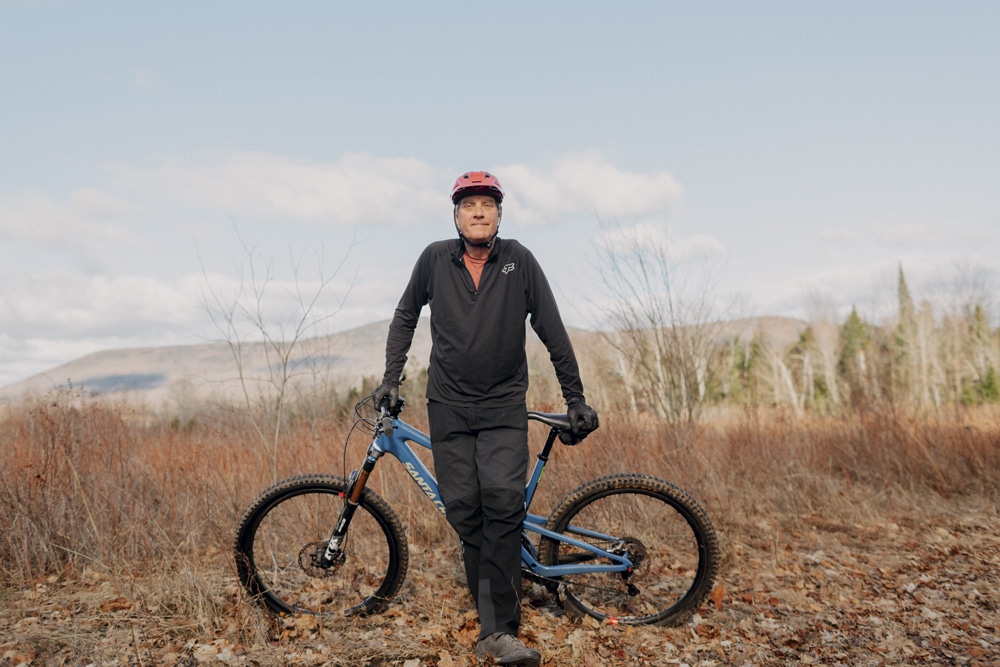
Photo Credit : Abigail Johnston
We’re deep in Vermont’s Northeast Kingdom, where bootleggers once smuggled whiskey along the trails that run like veins to the Canadian border just 30 miles north. The area has long since lagged behind the rest of the state in terms of prosperity, seeing high poverty levels while housing two of Vermont’s prisons. John Worth came here in 1988 to seek his fortune as a college graduate with a degree in ski area management. He opened a ski shop at the bottom of Burke Mountain, which was a struggling ski resort that would eventually bankrupt each of its four owners (it’s currently in federal receivership after the last, Ariel Quiros, pleaded guilty in 2020 to a $200 million security fraud scheme). Looking for a way to make money in the summer off-season, Worth invested in some Nishiki mountain bikes, crude and rugged machines that were part of the latest revolution in cycling. He sold all 20 that summer.
Worth realized that people then needed somewhere to ride. On the day we biked together as we journeyed north out of the valley, he showed me the old Nordic ski center where he had first cleared old cross-country routes for “rake and ride” mountain bike trails. But soon those were not enough to cope with the growing numbers of riders flocking to the area as word spread. Worth upped his game and sneaked deeper into the woods, engineering trails on other people’s property. “We were covert,” he says. “We didn’t have permission.”
He eschewed power tools lest he alert the landowners what he was building on their property. Bloody and bruised, he built trails by hand, working the ground with Pulaskis, with the goal of connecting trails, uninterrupted, mile after mile. The trail known as Widowmaker, built in 1989, got its name because it went under a dead tree leaning against a live one, which couldn’t be removed because Worth could not risk the noise of a chainsaw. He dragged wooden pallets in by hand to be used as crude bridges and hauled culverts into the mountains.
Worth saw the land as a canvas—the topography, natural features, and dry topsoil—onto which he might sketch his design, create his signature “fast and flowy” trails. All this, to answer the demand from the growing numbers of mountain bikers who were part of the zeitgeist heading into the backcountry on two wheels.
He discovered that Darling Hill, a north-south ridge rising abruptly to the west of town, was part of a glacial esker—the result of glacial melt that crushed rocks into stratified gravel and sand while pushing the larger boulders south, leaving soft, malleable loam that bikers crave and call “hero dirt.” Its consistency was perfect for molding berms and trails without the challenge of having to remove large rocks. Darling Hill became the hub of the trail system he created.
As Worth worked in secret, he was surprised at the generosity of the community. A 70-year-old local named Herb let him build a trail through his garden. Worth christened it Herb’s in his honor. Naming trails after landowners who let him use their property became a tradition. Later, Worth fell into casual conversation with some loggers who were bewildered to see him riding his bicycle down a steep skid road near a big sugarhouse. Worth told them he was trying to link up another trail but saw that his path was blocked by massive trunks. The next day he returned to discover that the loggers had used their bulldozers to clear the way.
When he expanded, though, he realized he was almost certainly going to run afoul of those whose land he had used without permission. His grand plan took a major step forward in 1993 when Doug Kitchel, a local politician and former owner of Burke Mountain, saw the huge economic potential that Worth, whom he considered a visionary, was building in the area. Kitchel went door-to-door with Worth asking for landowner permission, which was almost always granted. The following year the nonprofit Kingdom Trail Association (KTA) was formed. In 1998 it sold maps for Worth’s growing system, which was also a way to get riders to pay for access; by 2000, an expansive 50 miles of hand-built trails were in operation. Worth’s bike rental business flourished as bikers thronged the trails, riding in all weather.
While word spread about Kingdom Trails, there was symmetry with the burgeoning popularity of mountain biking and its renegade culture. The bikes that Worth sold became more advanced, with disc brakes like a car’s, and carbon frames that could withstand being ridden over stumps or rocks at high speed. But since these modern mountain bikes can cost $7,000, East Burke began to fill with riders atop expensive machines and with a sense of entitlement to match. “We were starting to see a little attitude ’round here,” Worth recalls.
And the number of riders coming to the trails around East Burke has kept growing. From 2016 to 2018, for instance, rider visits went from 94,000 to a staggering 137,000—a jump of 50 percent in only two years. The New England Mountain Bike Association’s annual party, NEMBAfest, a carnivalesque shindig of New England IPAs and demo bikes from leading manufacturers, takes place on Darling Hill every summer. Over 4,000 revelers attended in 2019. Winterbike, a fat-biking event that began in 2011, also flourished.Today, the trails give an estimated $10 million boost to the local economy.
Seeing the potential of the sport, new businesses followed. On the site of an old gravel pit now stands Mike’s Tiki Bar, where tales of valor and derring-do on the trails run rampant. The Burke Publick House and the Foggy Goggle, both catering to appetites for beer and partying, opened in 2014 and 2015, respectively. Inns and hostels such as the Kingdom Farm Lodge, a barn converted for communal living for mountain bikers, sproutedover the mountainsides. The area has even seen the debut of a multimillion-dollar luxury lodging property, the Inn at Burklyn, a sign of the growing affluence of mountain bikers. Today families from all over America have moved here to live close to trails in the affordable Vermont backcountry. East Burke, once a struggling rural community, is now a boomtown, seemingly a triumph deep in the wilderness.
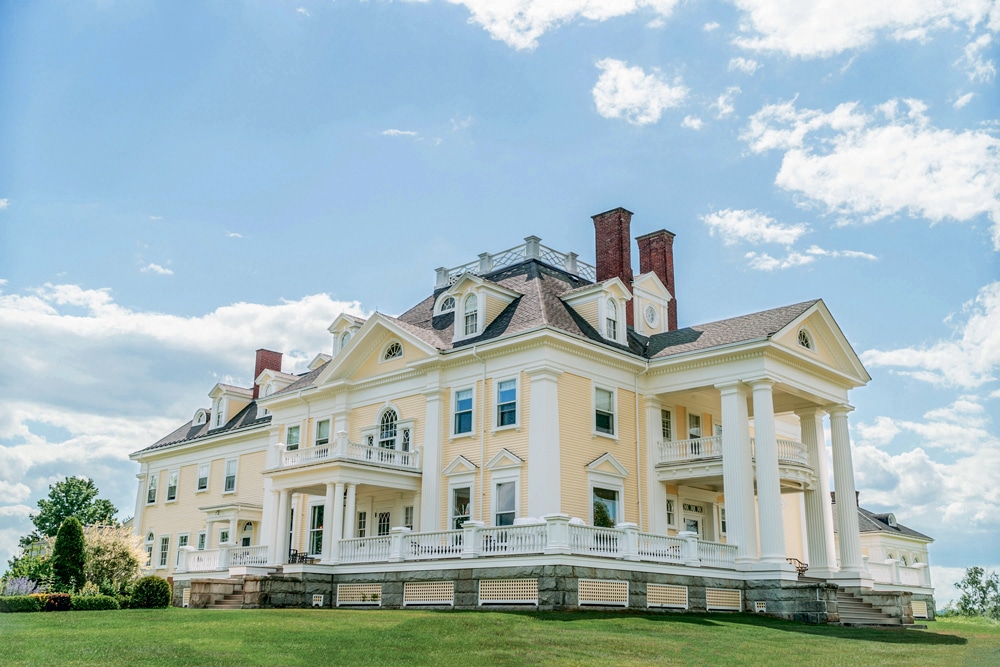
Photo Credit : Rodeo & Co. Photography
Key to Kingdom Trails’ success was the unique cooperation between nearly 100 landowners who grant access to their property for largely altruistic reasons, something quite unlike anywhere else in America. The nearest rival is Bentonville, Arkansas, which has 140 miles of machine-built trails largely paid for by the Walton family, owners of Walmart, which is headquartered there. It’s reflective of the different American cultural paradigms: bankrolling by corporate fortune versus rural Vermonters working together for the common good.
Kingdom Trails landowners receive no economic compensation for the use of their property, because if they did they could be sued under Vermont law if there were an accident. Instead, they offer their land for the benefit of the community, helping local businesses. “It’s good for the area and good for the economy,” says Walter Norman, who owns 1,100 acres and whose land I was riding on with Worth. “Some people say we’re turning the woods into Disneyland, but I don’t want that either. People are able to get out in the woods and explore. And there’s no emissions from something like ATVs.”
THEFRACTURE
But in November 2019, the wheels began to come off one of Vermont’s greatest economic success stories. Three prominent landowners at the heart of the trail system on Darling Hill—Sue and Gary Burrington (for whom the Burrington Bench Trail is named), Sharon Dolloff, and Mary Jane Miller—abruptly withdrew permission for their properties to be used for mountain biking. They sent a letter to KTA executive director Abby Long demanding all signs be removed and the trails closed.
“Immediately, I wanted to reach out to the landowners,” Long says, “but they chose not to communicate with us. I haven’t heard from the landowners what exactly caused it, but I believe it was multiple incidents. I think it was the strain that they felt from the numbers they were seeing. What we do know is that they wanted their privacy back.”
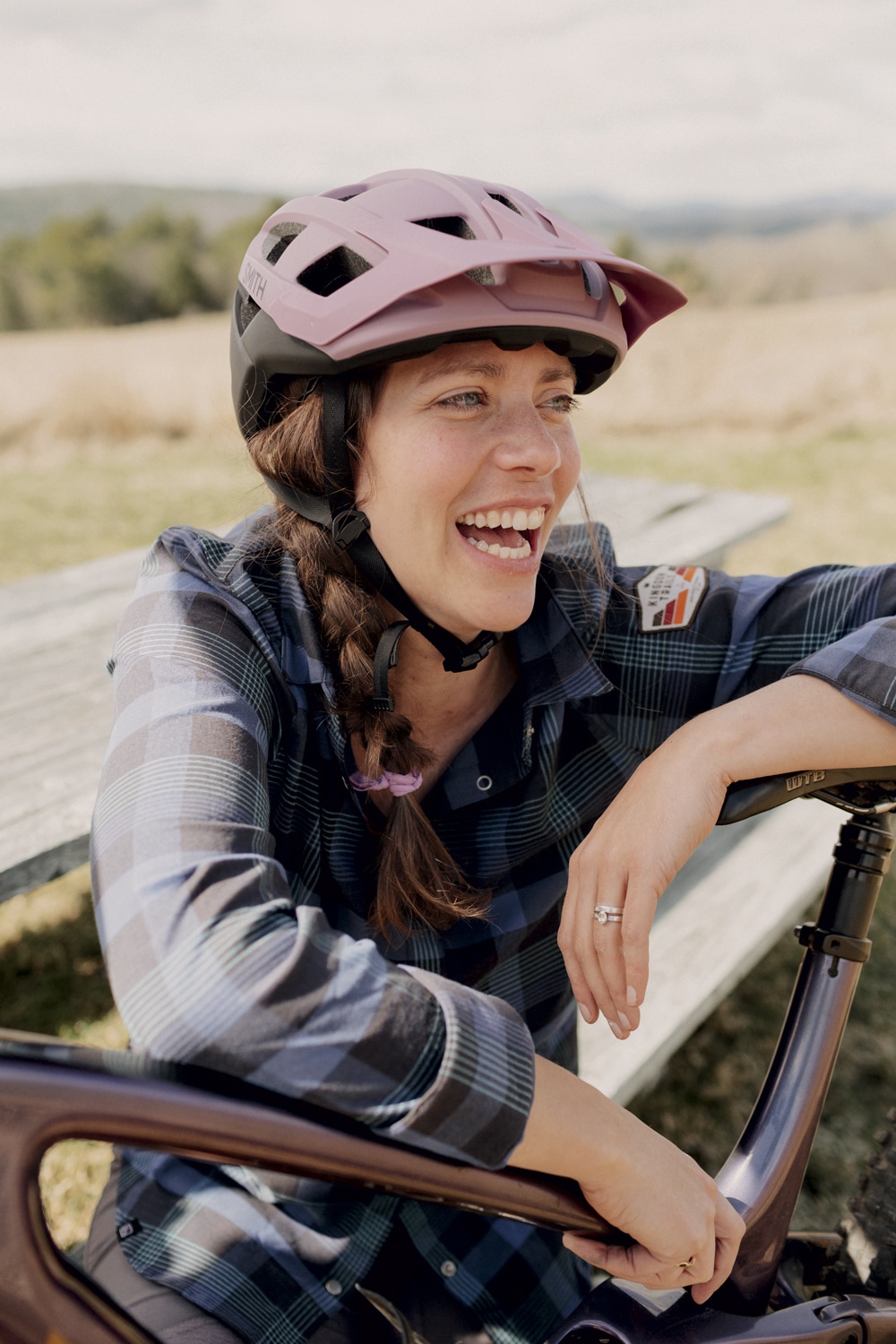
Photo Credit : Abigail Johnston
The details of their complaints remain a mystery. No one in the community seems to want to talk about it for fear of upsetting neighbors and business owners who depend on the income generated from Kingdom Trails. One rumor is that a mountain biker had sworn at one of the landowners riding her horse on her own land. Other landowners complained of bikers being disrespectful, engaging in verbal altercations, and even trespassing to swim in private ponds. Hastily convened meetings were called as shock and fear spread through the community, heightened by a conflagration on social media. Online forums for mountain bikers lit up with furious arguments all over the country, with riders assigning blame for the behavior that led to the closure, and making personal attacks and threats against the landowners and each other.
The now-forbidden land had composed the central hub of the system, on Darling Hill, where Worth first began his creation. Losing this crucial square mile containing 12½ miles of trails ripped the heart out of the system, destroying the interconnectedness that had made it unique. Worth was “surprised and devastated” when he heard the news because it was, simply, “the finest example of a trail building canvas that I had ever seen.” Moreover, at the outset, the landowners had offered Worth total access to do whatever he wanted on their land. “Many of my finest trail scouting, trail building, and certainly trail riding experiences have been on these properties,” he told me.
The ramifications were seismic. “The whole thing fractured,” says CJ Scott, Worth’s former intern and protégé, who first learned how to build trails back in 2002 and is now the KTA’s trails manager. He tells me this as we are hiking toward the closed areas on Darling Hill to see what has been lost.
“When that happened, we suddenly felt that the whole thing was going to go down,” he says. “We said to each other, ‘We’re going to be in a lot of trouble.’ The landowners just pulled out. There was no warning. It damaged a lot of businesses, people’s livelihoods. I get it that the locals were complaining that they couldn’t even make it into town to get milk on the weekend because there were so many cars and bikes.” But he continues, “We lost sight of what we were doing. We focused on business success, money, more businesses coming here and opening up—people having a great time. In the end, we were victims of our own success.”
We come across a makeshift cordon with a sign saying No bikes beyond this point. And just in case there’s any doubt, my cellphone erupts with a message from the mountain biking trail app that Scott designed with the manufacturer, Ondago: WARNING—You are currently on a trail that is restricted to mountain bikes. Please be respectful of our closures and our landowners. As we head deeper in, Scott points out trails that he labored over, now untended, berms collapsed, swallowed by rampaging vegetation. He becomes emotional. “It’s been a year and a half since I’ve been in here,” he says. “Oh man, this is painful.” He shows me how runoff from recent rainfall has torn a trail apart.
Scott knows who to blame for land permission being withdrawn. “Mountain bikers have changed,” he admits. “They feel as though they own the trails, that people should be grateful to have them here. You can tell them to respect what we built here, but if just 5 percent of 130,000 riders are idiots, well…” He pauses. “That is still an awful lot of a–holes.”
TRUEBELIEVERS
Georgia Gould, an Olympic-medalist mountain biker and one of the greatest American women cyclists of all time, steers her Specialized Epic Evo over the Black Bear Trail, a fast and aggressive descent of humpbacks and sharp turns. She gives me instruction, preventing me from vaulting over the handlebars. “Stand on your pedals on the balls of your feet! Let the bike move beneath you!”
Gould has joined Worth and me on our ride. She and her husband, Dusty LaBarr, moved to East Burke in 2018 from Colorado, after she retired from her racing career. The couple were looking for an affordable place to raise a family with a more relaxed pace of life while still offering the outdoor life they craved. Gould quickly became a fixture in the town, riding while pregnant and then later, after her son, Jude, was born, while he was seated at the front of her mountain bike and pedaling some of the easier trails. “My husband was like, ‘Are you kidding? That is the most dangerous thing I have seen!’” she says. “But I know the safest place for him, and where I have the most control over things in life, is on my mountain bike.” Three months after giving birth, she took part in a race. “Some of the riders were pretty aggressive, using elbows,” she says, laughing. “They were like, ‘I’m not going to get beaten by the lady breastfeeding her baby in the parking lot before the race!’”
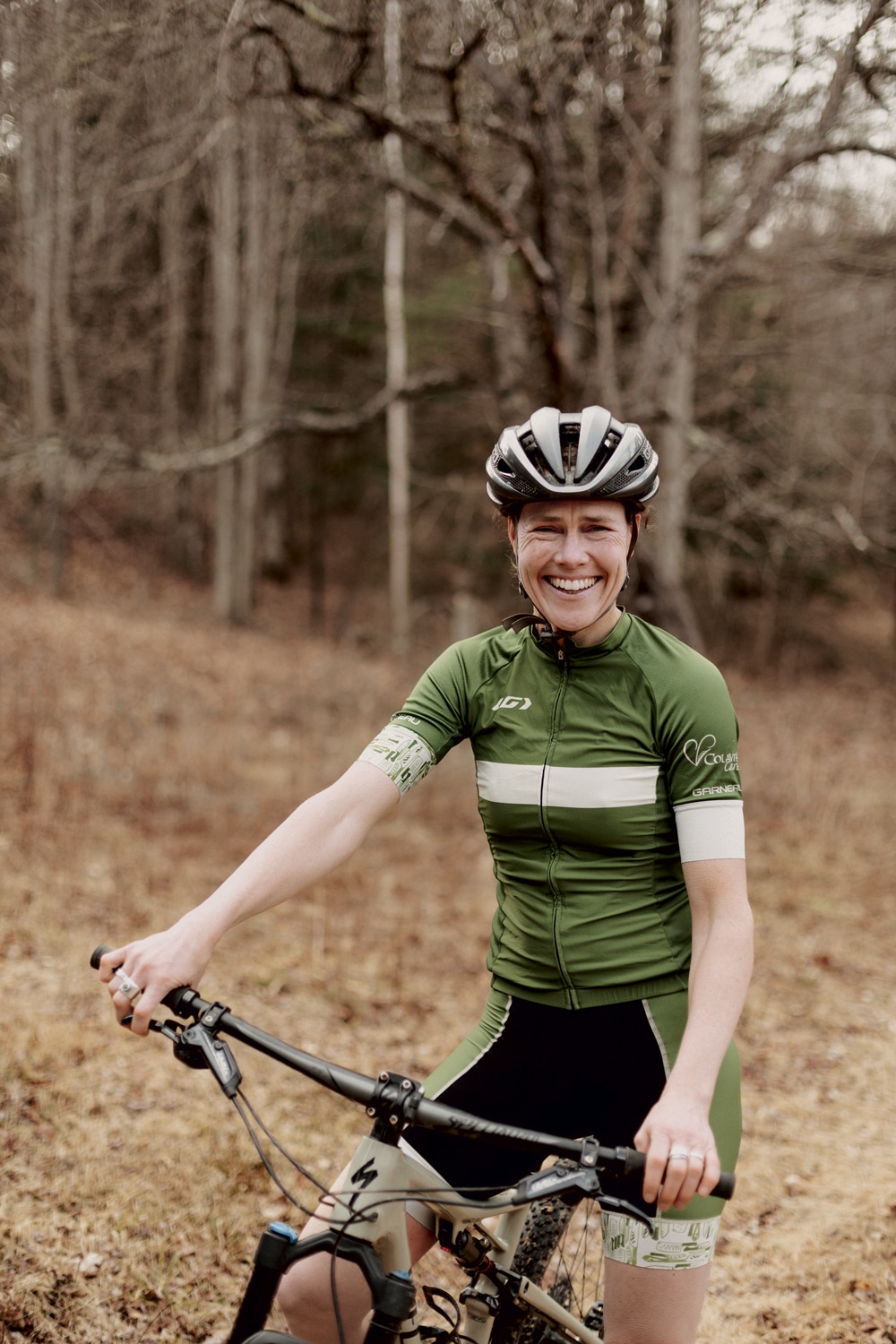
Photo Credit : Abigail Johnston
Gould and her family live north of town, on land with an apple tree and a garden where they tend chickens and bees. Trails run through the property, so they are part of the system. They love the sense of community. “People just knock on your door and walk in your house,” she says. “When my son was born, I got a card from someone I didn’t know saying, ‘To the parents of the new baby boy.’”
Gould sits on the KTA board and plays a key role in the trails’ development, although news of the loss of permissions hit her hard after having just moved here. “Kingdom Trails should have been reaching out to landowners to make sure they were happy and to see what was going on,” she says. “I’m hopeful that the landowners may give the trails back, but I think when they said, ‘Take all the signs out and don’t let anyone on anymore,’ it is hard to walk that back.”
If Gould represents a new wave of out-of-towners looking to settle in East Burke, then there are also those like Jody Fried, a smiling, optimistic soul who grew up here, left, then returned to give his kids the type of childhood he remembered. He left a career with a multibillion-dollar corporate health-care company in Colorado and moved back to East Burke in 1999, when he bought the town’s store and gas station and became an important voice in ways to revitalize the Northeast Kingdom. He is past president of the Burke Area Chamber of Commerce, executive director of Catamount Film and Arts in St. Johnsbury, and director of the Vermont Leadership Institute.
Looking back on growing up here, he remembers the economic devastation wrought on local towns in poor snow years, and how the conditions at Burke Mountain failed to attract skiers. “A whole bunch of businesses, like bed-and-breakfasts, would close in the spring,” he says. But the resilience of the community in working together and sharing land and natural resources was what made the place so special, he adds. “For example, we never gave any thought to where we would go fishing when we were growing up—even if it was someone else’s pond, that’s just what we did. It’s part of the heritage of the place. It goes back generations, when folks have granted access to their lands for everyone: cross-country skiers, hikers, hunters.”
There is no better advocate for the health benefits of the trails than this avid mountain biker. In 2014 Fried was diagnosed with two very aggressive forms of cancer. After being bedridden for four months, he took to his mountain bike to ride the snow and to build up strength in his lungs. “Of all the trails, I chose Widowmaker,” he says. “The cold on my face, the glistening snow, the intense physical activity, [it] puts me in an intense meditative state. Every day I am eternally grateful to be here.
“It is amazing that so many landowners would open themselves up to something like this,” he continues, “but there is a fragility to that, and a threshold and a balance, and if that gets out of whack it can get threatened. But there has to be a balance between economic growth and quality of life.”
Perhaps nothing is more significant in the development of East Burke’s growing ability to re-create itself and draw affluent clientele than the renovation of the neoclassical mansion-turned-inn Burklyn Hall, which stands proudly atop 1,400 acres at the peak of Darling Hill.
The former home of Elmer Darling, a prominent 19th-century New York businessman and hotel owner who bought land in East Burke and invested in mills and farms, it had fallen into decay after its previous use as a dormitory for Lyndon College. Then local mountain biking fans Sharon and Bob Morse brought it to the attention of Bob’s cousin, Marci, and her husband, James Crone, a successful property developer from California. Crone bought the mansion for $1.8 million in 2018, setting the stage to rehabilitate it as a luxury inn.
“We wanted to bring the mansion into this century in the way Elmer would have done it,” Crone tells me, as he points out the original peacock wallpaper in the inn’s wood-paneled office. “You will find nothing in here from Home Depot.” The building was in such disrepairthat one couldn’t even walk on the front porch without the risk of crashing through rotten boards. Materials were sourced from craftsmen across the country to ensure the mansion was kept as originally envisioned, only updated. No nails were used in the construction, lest the vibration damage the plaster.
They took down the three acres of moribund pines that darkened the house and obscured it from sight. Finally, the renovated mansion with its restored gabled dormers again stood sentinel over East Burke. And then, just a few months before the formal opening, disaster struck: One of the greatest selling points of the new business, direct access to Kingdom Trails, was lost. The Mansion Trail, which connected to the Darling Hill network, was now in the no-ride zone, and bikers would be pushed onto busy roads to reach different parts of the trail.
SharonMorse worked with CJ Scott to come up with a solution. They designed and built the Burklyn Loop Trail—specially geared to families and children—to tie back into the network and help keep riders off the roads. And in its way, it links back to the start of Kingdom Trails three decades ago, when John Worth knew if he built it, people would come.
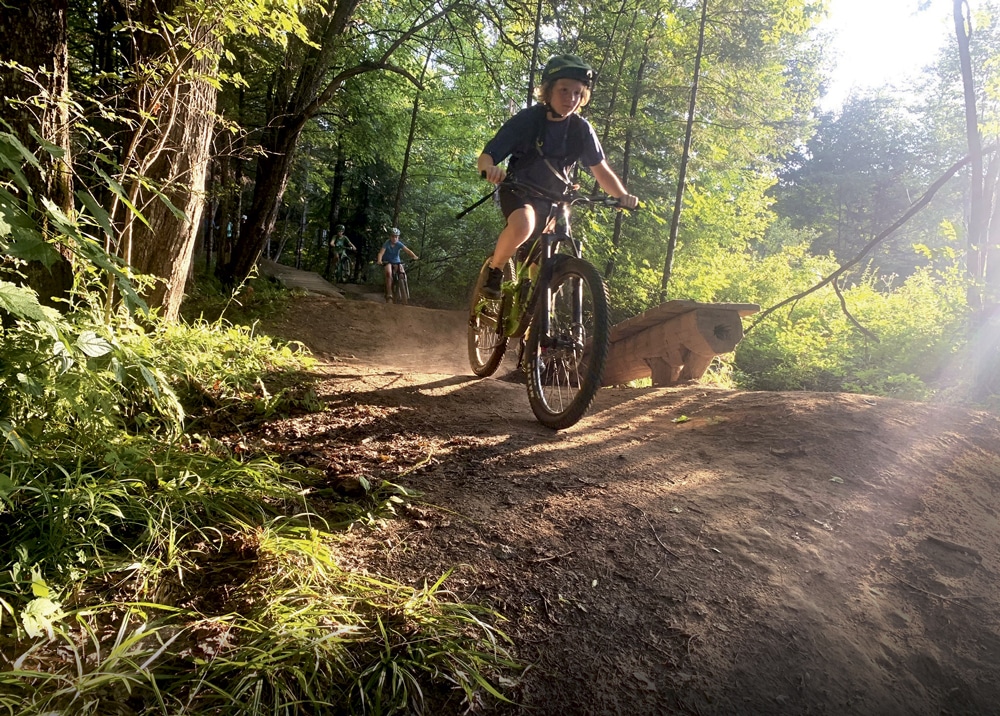
Photo Credit : Keara Kresserski
One morning, while I am still wondering what the future holds for East Burke and Kingdom Trails, I sweep down the grand driveway of the inn and meet Georgia Gould at the bottom. We ride to Heaven’s Bench, so called because of its sweeping views from Darling Hill. It is a trail that represents just one of a number of initiatives that management is taking to preserve the trails.
In 2015 the KTA paid $300,000 for 133 acres to secure the trails on that land, which were some of the first built by Worth. And the association recently bought 229 acres from Burke Mountain in conjunction with the Vermont Land Trust, along with 40 neighboring acres, when it heard that the land was going to be turned into a housing development on Darling Hill.
“It was somewhat controversial,” says Gould, as we ride to Sidewinder, a swooping half corkscrew of a run that riders like to video themselves attacking and post to YouTube. “Some people don’t want to buy land for Kingdom Trails, as it could create a situation where people will only want to sell for mountain bike access land and the prices will inflate.”
Yet so far the move has been successful. Now, special committees reach out to address landowners’ concerns every month. “Trail ambassadors” ride the trails to monitor miscreants. A “rider education” program teaches bikers about where they are riding and whom they should be grateful to. And a $100,000 feasibility study was undertaken by a Burlington engineering firm to offer suggestions on easing parking congestion both in town and near trailheads.
Gould says she and her family have no regrets about their move to Vermont; in fact, they wish they had done it earlier. “When the pandemic hit and my friends in New York were cooped up in tiny apartments, I was hitting the trails here like nothing had happened,” she says. “Actually, I think the pandemic has been good for Kingdom Trails. We needed a reset here, for things to calm down and to refocus.”
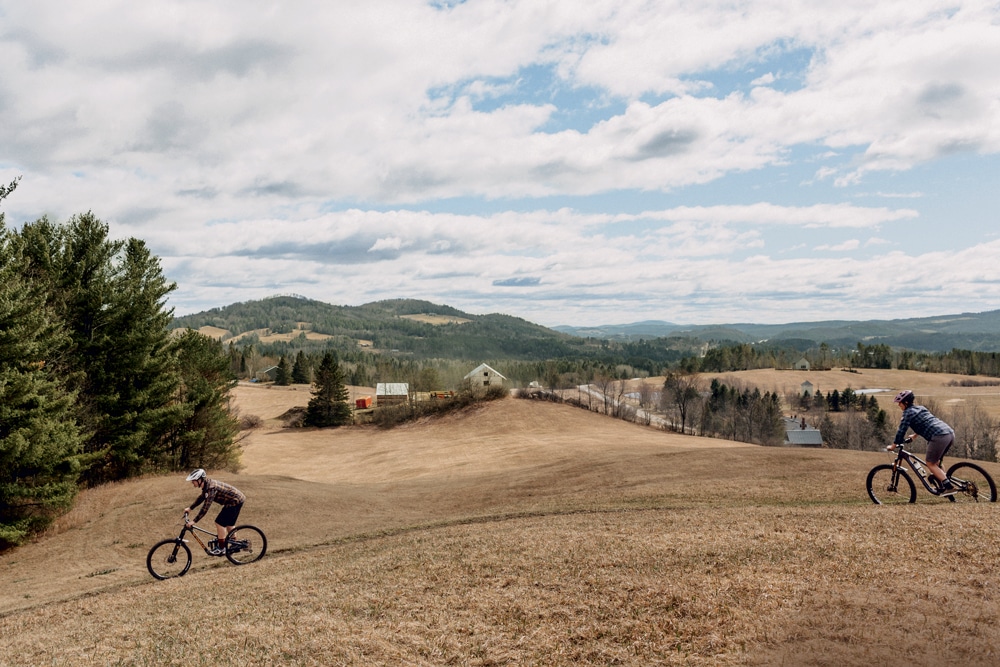
Photo Credit : Abigail Johnston
When I ride again with Worth, he acknowledges the KTA did not “do the best job” respecting, hearing, and thanking the landowners. “This was an eye-opener for us, and I know we have learned from it and taken major steps to make our landowner relationships better.” He says Kingdom Trails will “rebound and continue to grow and prosper.” Worth points out that they built 12 more miles of trails in 2020, largely to the northeast of town, in the East Haven area, away from Darling Hill, and the goal is to add at least five more miles a year. These days they use machines, a far cry from Worth doing it all by hand all those years ago.
Worth hopes one day the network will link with West Burke, about six miles to the northwest. It is a town just holding on, with a shrinking population of just 320. The One Burke initiative, started in 2017 with the Vermont Council on Rural Development, is being led by the West Burke community. The plan is to connect the trails with that town to help bring it economic prosperity while alleviating the demand on East Burke’s services and roads.
Worth and I cover 17 miles of uninterrupted single-track on our ride, scaling 1,600 feet of heart-thumping ascents, a glorious journey into the unspoiled beauty of the Northeast Kingdom. For the last mile we ride through the well-tended back meadow of his neighbors, a retired couple who wave as we pedal through. Back at his own house, Worth offers me a local IPA as we sit on his back deck, admiring the mountains threaded with his trails. “It’s funny how all trails begin and end at my house,” he says with a grin, “one way or another.”


